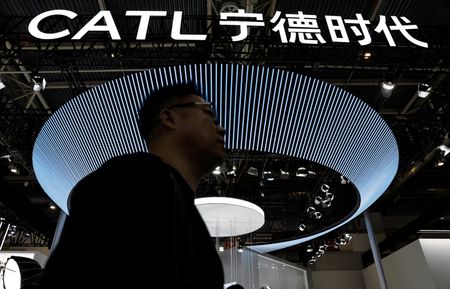By Heekyong Yang and Joyce Lee
SEOUL (Reuters) -South Korean battery maker LG Energy Solution (LGES) on Wednesday said it expected revenue in the second quarter ended June to decline from Q1 partly due to uncertainties from U.S.-driven tariff policies.
The announcement dragged LGES’ shares down as much as 4.4% at midday (0300 GMT) compared to a 0.7% drop in the benchmark KOSPI.
LGES, whose customers include Tesla, General Motors and Hyundai Motor, noted key automakers were expected to be conservative in their battery purchases because U.S. tariff policies were uncertain.
Manufacturers who “produce outside the U.S. and supply to the U.S. are very carefully checking their production strategies,” CFO Lee Chang-sil said in an earnings call.
“There have been expectations that LGES would see a revenue rebound in Q2, but the company guided for lower Q2 revenue compared to the previous quarter, which seems to have dampened sentiment,” said Kim Hyun-soo, an analyst at Hana Securities.
LGES said on Wednesday it expected to cut 2025 investments by around 30% from 2024.
It also put on hold the construction of its energy storage system (ESS) battery plant in Arizona deciding to first utilise existing capacity at its Michigan plant, where it will start producing lithium iron phosphate (LFP) batteries for ESS this year, a year earlier than planned.
LGES said it was expanding its ESS business to mitigate the impact of slowing EV demand in North America as Chinese players would not be able to enter the market for the time being due to the tariffs. The company said it would also continue to develop a supply chain that is decoupled from China.
LGES reported a 138% rise in first-quarter profit of 375 billion won ($261.96 million), as favourable foreign exchange rates helped cushion the impact of slowing electric vehicle sales growth in major overseas markets.
The battery maker in a regulatory filing said it would have booked an 83 billion won operating loss without a tax credit received under the U.S. Inflation Reduction Act.
The South Korean won’s average exchange rate was 1,452.9 per U.S. dollar in the first quarter, 8.5% weaker than the year-earlier average of 1,329.4. That means LGES could buy more won with dollars earned from U.S. sales.
Also boosting Q1 earnings were solid EV sales reported by customer GM, analysts said. The U.S. automaker reported domestic EV sales of 31,887, 94% more than the first quarter of 2024.
GM on Tuesday retracted its annual forecast, reflecting uncertainty surrounding the impact of a trade war instigated by the administration of U.S. President Donald Trump. The automaker also pushed back its investor call due to changes to the United States’ import tariff policy.
The same day, Trump signed a pair of executive orders to soften the blow of new tariffs on the auto industry, offering a mix of tax credits and relief from other levies on materials.
LGES said sales of GM’s mass-market EVs increased month-over-month in the March quarter, but said it will make conservative assumptions concerning production in regard to GM as tariff volatility continues.
($1 = 1,431.5000 won)
(Reporting by Heekyong Yang and Joyce Lee; Editing by Christopher Cushing and Kate Mayberry)









